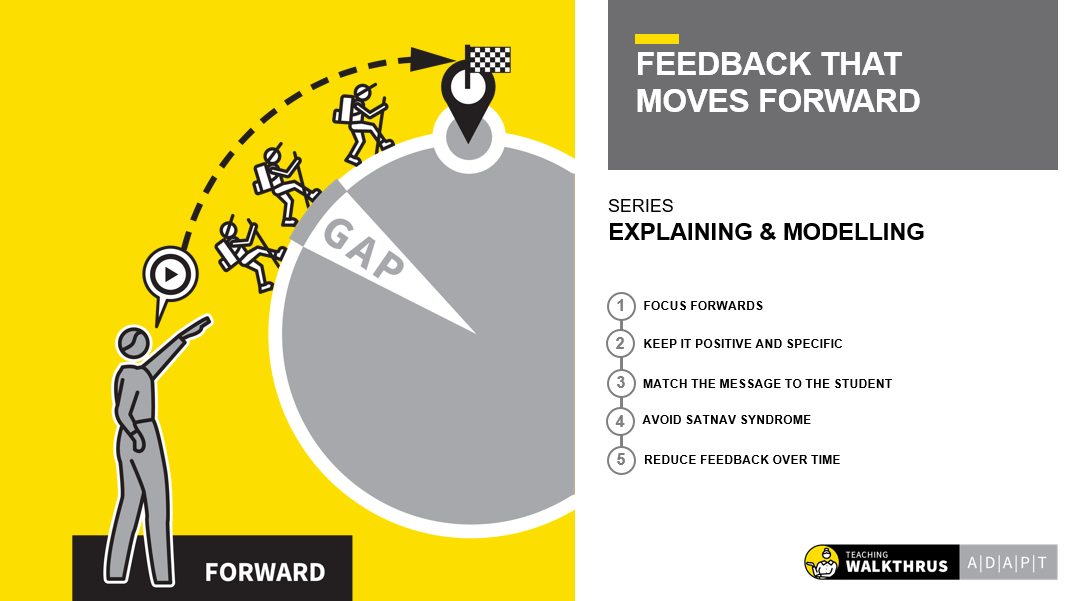7 November 2021

|
Whole School CPD Focus: |
Feedback and Questioning |
|
Walkthru Cluster: |
Feedback and Questioning |
|
Walkthru: |
‘Feedback that Moves Forward’ (page 104) plus the Teacher Workbook
|
|
Starting Point |
Questioning and Feedback - YouTube
|
|
Reflections…
This term has been focused on sharpening our skills in relation to questioning and feedback. As we all know, feedback facilitates student progress and it supports students in deepening their knowledge and understanding. Crucially, it is important to recognsie that effective feedback must be UNDERSTOOD and ACTIONABLE so that students are able to use truly learn. Alongside the specific strategies that students need to apply in order to improve, feedback should also motivate students to apply effort.
So what are the different stages of Sherrington’s Walkthru: Feedback that Moves Forward? Stage One: Focus Forwards. Sherrington suggests that it is important for teachers to use formal and informal assessments to identify gaps in students’ understanding. This is something fundamental to effective planning and is the foundation block of our mantra: FEEDBACK-PLAN-TEACH. When making these assessments, Sherrington suggests that it is important to do so in terms of actions that they may take, rather than describing past performance. By describing actions that will improve their future performance, students will improve. The timing of feedback given is also important; feedback needs to be given part-way through a learning cycle, not at the end; students will then view the feedback as meaningful and supportive.
Stage Two: Keep it Positive and Specific. In order to complete stage one by being motivating and actionable, feedback should also be positive and encouraging. Tell students how they are succeeding as well as those things that could be done differently. Be specific so that students know what to do in response; for example, rather than telling a student to ‘write a better conclusion’, explain how their conclusion could be improved.
Stage Three: Match the Message to the Student. Our relationships with students are one of the levers empowering them to make progress. Knowing when to probe further and when to move on relies on intuition and highly complex interpersonal skills. Sherrington, quite rightly, suggests that truly effective feedback will only succeed if students trust it and use it to motivate them to WANT to do better and to improve their performance. Like all humans, students are complex. They all have different needs and our feedback needs to be tailored to suit those needs.
Stage Four: Avoid Satnav Syndrome. Sherrington’s analogy works well here. He suggests that ‘Satnav provides continuous direction making it possible to travel from A to B without ever learning the route.’ As teachers, we want our students to LEARN how to approach a task so that they are able to approach future problems in a similar manner – to ‘learn the route’. He suggests that teachers should provide prompts and clues but leave students to take improvement steps independently. They need to think about what is needed and not to simply follow step-by-step instructions.
Stage Five: Reduce Feedback Over Time. As students become more independent and practice approaches for themselves, it is anticipated they will gain confidence; at this point, Sherrington suggests reducing the level of feedback provided and also to increase the ‘struggle time’. Students must be able to self-assess so that they can progress when ready, rather than relying on the teacher before moving on. Exemplars, WAGOLLs, study guides and worked answers should be available as needed.
The effort spent in implementing this Walkthru correctly could also help reduce workload as written feedback may become less detailed as students gain confidence and grow more adept in analysing their own performance.
|
|
|
CPD Cascade |
RLO – Cold-Calling Reflections https://classteaching.wordpress.com/2021/10/21/reflections-on-cold-calling/
RHO – Sherrington’s Checking for Understanding 7 Principles of Effective Feedback (RHO)from Teacher Toolkit
https://www.youtube.com/watch?v=v3UazBMmwVA
Mini-whiteboard tips (RHO)https://www.johntomsett.com/2021/10/17/this-much-i-know-about-how-to-get-better-at-using-mini-whiteboards-in-your-classroom/Sexual Harassment and Gender StereotypingFree online training to tackle sexual harassment, language and gender stereotyping. https://training.ukfeminista.org.uk/
National CollegeRemember that there are subject-specific watchlists available in National College.
Useful Webinars from Creative Education (RSW)
Title: Tics and Tic Disorders: Recognising & Supporting Date: 15th of November at 4 pm UK time How to book: Register here to attend
Date: 16th of November at 4 pm UK time How to book: Register here to attend
Title: Whatever you are passionate about, it needs to include Postural Care too Date: 10th of November at 4 pm UK time How to book: Register here to attend
Title: Developing & Implementing a Relational Approach to Behaviour Date: 9th of November at 4 pm UK time How to book: Register here to attend
Using Personal Growth Plans as a Springboard for Staff Development New to the Role of Mental Health Lead Supporting Staff Mental Health in the Current Context Monthly Safeguarding update: November 2021
|
Posted by Rachel Long
Category: Teaching and Learning Digests
